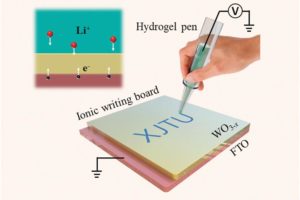Scientists in China have made a rewritable electrochromic display using a hydrogel for the first time.
Typical electrochromic devices contain upwards of five layers, their complicated structures contributing to high production costs and hindered performance. Now, a team led by Hong Wang of Xi’an Jiaontong University has devised a much simpler structure.
Their system contains a multifunctional hydrogel deposited directly on a tungsten oxide film on top of an F-doped SnO2 (FTO) layer. To make this possible, the researchers embedded the hydrogel with aqueous lithium chloride, allowing it to simultaneously act as a transparent electrode, electrolyte and ion storage layer. By reducing the number of interfaces present in the device, the team were able to improve the performance of the device for display applications, compared to other electrochromic systems, while also reducing production costs.
To read the full article visit Chemistry World.
Multifunctional hydrogel enables extremely simplified electrochromic devices for smart windows and ionic writing boards
Huajing Fang, Pengyue Zheng, Rong Ma, Chen Xu, Gaiying Yang, Qing Wange and Hong Wang
Mater. Horiz., 2018,5, 1000-1007











